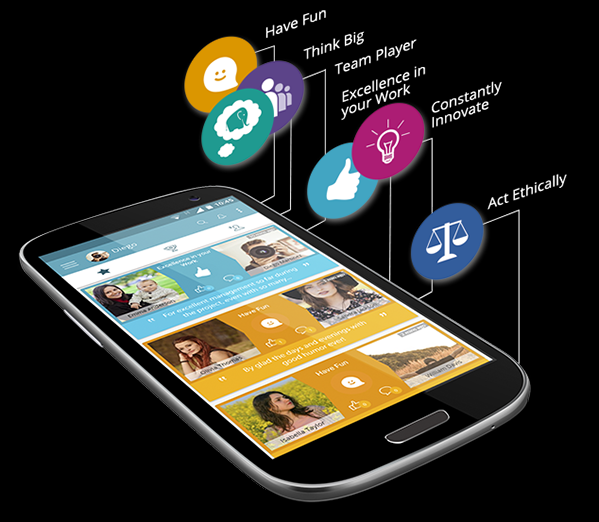For many organizations, digital transformation means customer-driven, technology-enabled organizational change. In many cases, however, organizational change also drives technology innovation.
That’s the situation that global digital consultancy Globant found itself in as it reached an inflection point in its growth trajectory.
In 2008, when the company was five years old and about 300 people, the executive team assembled a manifesto of values. Globant’s growth was set to explode, and they realized they risked losing its unique culture as it grew – especially when opening offices in different countries.
 The key insight: the team realized that management cannot drive corporate culture during periods of rapid growth. Instead, the employees themselves must do so.
The key insight: the team realized that management cannot drive corporate culture during periods of rapid growth. Instead, the employees themselves must do so.
The challenge then becomes understanding the behaviors that employees should exhibit and then encouraging the employees themselves to reward each other for that behavior.
Such an employee-centric, reward-based approach to maintaining the values and culture of Globant is the motivation behind Globant’s new product, StarmeUp.
StarmeUp is one of the offerings Globant has built via their Services over Platforms strategy I wrote about in an earlier BrainBlog post.
StarmeUp is a mobile-first employee gamification platform that helps improve the employee digital journey. StarmeUp focuses on fostering peer-to-peer recognition in organizations, thus helping them grow their culture, reinforce organizational values, and bring both transparency and meritocracy to day-to-day work.
Central to the StarmeUp platform is the ability for employees to provide positive feedback for other employees, often several times per day. Using StarmeUp, employees can recognize each other by sending stars for all the positive actions that happen every day. In this way the employees themselves become guardian of the corporate culture.
Gamification is also an important element of StarmeUp. StarmeUp engages users and keeps them up to date with what is happening within the organization. Individuals can see each other’s scores, leading to friendly competition. Every office displays a leaderboard, showing the local stars for everyone to see.
From the perspective of management, furthermore, StarmeUp offers a treasure trove of useful data. On the positive side, managers can identify key employees who act as multipliers of the culture, identifying positive influencers and hidden talent. On the other hand, StarmeUp can also recognize cultural or morale issues, for example, if a particular office is becoming isolated from others in the organization.
Today Globant has well over 5,000 employees globally, and credits StarmeUp for helping it maintain its unique corporate culture. But now it’s time to take this product to its customers.
An early example: a midsize bank with over 20,000 employees. In the first week after deploying StarmeUp, this bank recorded more than 10,000 recognitions between one employee and another. Furthermore, employees sent over 60,000 stars (recognitions that impact individuals’ scores) in the first month.
Only time will tell whether StarmeUp will help this bank maintain its culture as it grows – but it’s important to note that StarmeUp isn’t only for small organizations. After all, larger organizations have even greater cultural challenges as they face a digital future.
The Intellyx Take
As an innovative digital consultancy, it makes sense that Globant would have built a tool like StarmeUp for its own use. After all, digital consultancies are in the business of applying digital technology to solve business problems – including their own.
If you take a step back and look at the broader story, however, there is more to StarmeUp than meets the eye. Digital transformation, after all, is business transformation, and the technological and organizational changes inherent in such transformation go hand in hand.
As organizations digitally transform, therefore, they can expect and desire for their cultures to change – and one of the more difficult organizational challenges that digital presents is how to steer this change in the right direction.
For companies with rigid hierarchies, cultures tend toward an “us vs. them” mentality, where one group or department doesn’t have the best interests of other groups in mind when they make decisions.
Breaking down this adversarial aspect of many corporate cultures is critical to digital transformation, because digital efforts require greater cooperation across disparate groups within the organization to meet ongoing customer needs.
A tool like StarmeUp, therefore, can repurpose employees’ innate competitive nature and turn it around, fostering a collaborative culture instead of an adversarial one. True, employees will only find themselves on the leaderboard if their colleagues award them stars – but what is the best way to earn stars? Finding opportunities to award them to others.
In other words, people win by making each other successful – a central empathic pattern that is essential to modern digitally transformed cultures. Globant has figured this out for themselves, and with StarmeUp, it is bringing this essential enabler of digital transformation to its customers as well.
Copyright © Intellyx LLC. Intellyx publishes the Agile Digital Transformation Roadmap poster, advises companies on their digital transformation initiatives, and helps vendors communicate their agility stories. As of the time of writing, Globant is an Intellyx customer. Intellyx retains final editorial control of this article.



